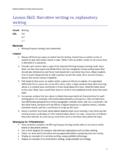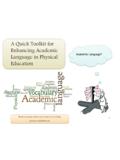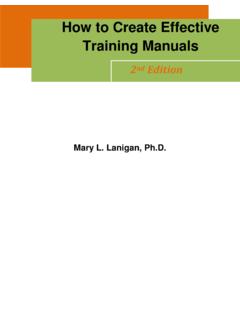Transcription of The Art of Creativity - Julieanne Kost, Photoshop and ...
1 The Art of Creativity At least once a year, attempt to fix whatever you complain about the most. If you can do this, it will have a profound effect on your life. Take a good look at yourself and your life and see what really bothers you. Whether it's your job, your computer, how much rent you're paying, or how long it takes you to get to work, the things that keep you up at night take your focus away from being creative. Some things can be easily remedied; others like bad habits are harder to change. All of the energy you expend on those things can be spent elsewhere in more creative ways. We tend to want to do it all, but choosing what to spend time on is a huge step toward getting more out of your own Creativity . With that said, know what you can and cannot change! Set your goals, figure out your priorities, and write them down I suppose this is just another way of saying, figure out what your priorities are!
2 What is truly important to you? Is it possible to let those other things go so that you can devote more time to what you enjoy doing? What are your short- and long-term goals? Have you ever put them down on paper? Don't be afraid, give it a try. Once you've settled on what's important, keep those goals close at hand so that you can refer to them as you need to throughout the day, week or months. Take 15 minutes for yourself every day. I struggle with always putting work ( , obligations) before Creativity . I have a very difficult time allowing myself to enjoy Creativity unless everything else is done. Specifically, I abstain until everything else has been checked off my list of obligations. It's as if I'm Cinderella and I. have to get everything done before I go to the ball. If you have this tendency, make sure you do eventually get to the ball, even if it's just for 15 minutes.
3 Keep a journal. The most difficult part of keeping a journal is starting the first page. My advice is: just start writing, and then keep going. I use two different sketchbooks - both without lines and carry I carry them with me everywhere. One of the books is for work-related topics, the other one is for my own personal thoughts. This seems to work for me because I can create all of my to-do lists in my work book where I can make a mess and cross things off of my list while leaving the other journal for making more lasting and personal notes about dreams, thoughts etc. My journal is a kind of catchall for thoughts, sketches, diagrams, little quotes, and scraps of things I come across. I have sections for quotes, movies that people recommend, web sites that are worth surfing, and bottles of wine I've enjoyed and would buy again.
4 Really, anything I. don't think I would remember otherwise. I write down random things I want to remember. Advice is a big one, and words of wisdom. Some entries are simply humorous, while others are things I know I need to give more priority to. It's interesting to return to your writings later and see if his perception has changed. 1. Figure out what you need to do to reach your zero point.. Your zero point is the point at which you can let go of everything when you stop thinking about life, work, and the things that make up your daily routine. I can't mix Creativity with daily stress. I need to unwind from work pressure, change my environment and even do some domestic tasks, like laundry, before the creative process kicks in (or before I allow myself to focus on it). I guess what I mean is that you must find your own form of meditation.
5 I tend to picture meditation as the practice of sitting in an uncomfort- able position on the floor, but I think people meditate more than they realize. When I used to commute about an hour each day, I noticed that the stress I had been feeling at work was washed away during the commute time. It was a transition period. Now that I no longer have a commute, I like going for a long walk in the morning this exercise serves as a meditation and keeps my body moving. Collaborate with others - share thoughts, ideas and information The people I've been fortunate enough to meet and it's been a diverse group ranging from designers to photographers, fine artists to scientists have had a profound influence on me. They constantly expand my notions about what digital imaging means and how Photoshop is used. They expose me to new ideas and ways of thinking and problem solving, ranging from how best to photograph wildlife on a glacier to capturing a criminal using an unimaginably blurry photograph.
6 We connect because we're passionate about what we do and because we share information to help each other achieve our respective goals. The people I see as being the most successful (both personally as well as financially) tend to share everything they know. They don't fear that giving away technical information puts them at a disadvantage. In fact, because they know that they can't possibly know everything, this is the only way to go about their work. Their biggest asset is who they are, how they think, and how they solve problems. They prefer to talk about what the content of the image is communicating rather than the techniques used to capture it. They realize that sharing technical information can help craft a mechanically proficient print, but having something to say within an image is something else entirely.
7 Sharing your work with other people is also important especially as you're working on it. Sometimes, I just need a sounding board - someone to talk to about a piece in order to clarify the direction of the piece. I'm fairly confident that just talking to myself would help, but talking to another person helps me to focus what I'm trying to say . By verbalizing, it becomes that much more real and helps me to continue a project when I'm in a rut. Be flexible. Learn to negotiate - with others, but also with yourself. This is one I struggle with daily. Pick your battles. Fight for the things you care about the most and let the rest go with as much grace as you can muster. In short, recognize what you can and cannot affect. We all know how wonderful we feel when everything goes well with a piece, but for as many times as I have artwork flow from me, there are at least twice as many times when it just gets stuck somewhere.
8 It's important that I have the flexibility to put a project away for a day, a week or a month. A piece of art is destined to become what it's meant to be in its own time, and you can't force it into being anything else prematurely. As for negotiations, if you can't negotiate on your own behalf, you will miss out on getting all of the things you want and deserve, whether it's a bigger paycheck, more time to work on a project, or more time off. It's worth learning how to effectively ask for what you want. This also enters into the world of managing client expectations. Clients will want the world, they want it now, and they'll want it for free. Set realistic expectations and deadlines. If opportunity doesn't knock, build a door! . Don't fight change - it's the one thing you can be sure of. 2. Look at new stuff and at what you already know with a fresh perspective.
9 Pay attention. Don't go through life in a daze. We're creatures of habit we drive to work by the same roads every day, we eat the same foods, we tend to solve problems in the same way time after time and it's very tough for us to break out of our molds. But, if you do something different every day, you simply expand on your base of experiences. (On the other hand, we're so overwhelmed with information some of it significantly more useful than the rest that learning to filter is a valuable skill to acquire as well. The camera is my filter filtering in what I want to see in the world and filtering out what I want to ignore.). If you really want to get a fresh perspective on things, try hanging out with a child. The ones that I know aren't afraid to ask questions or say what's on their mind for better or worse!
10 You might be surprised how honestly they respond to your work and how much you can benefit from their perspective. Take up an interest in something you know nothing about. I call this my become a beginner slogan. It flips the learning switch on and expands your mind in a new direction. Besides, it's fun you don't have to know anything about it, and there's no such thing as a stupid question. I've found that as I get older I tend more often to fall back on the things I already know, and I am perhaps more resistant to new experiences. The occasional class in encaustic painting, or ceramics, or diving keeps my brain busy and, hopefully, well exercised. Master your tools. I grew up in a household that was both creative and technical: my mother was a painter and print maker; my father was an engineer whose hobby was photography.





